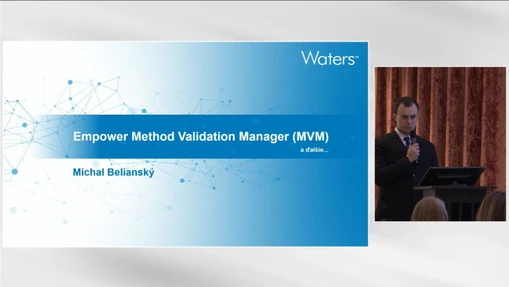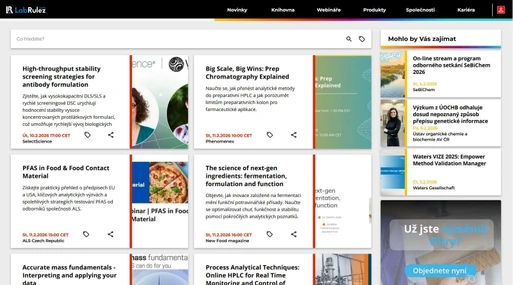Česká chromatografická škola - HPLC.cz 2021 - Den 4
_l.webp)
Česká chromatografická škola - HPLC.cz 2021 - Den 4
Úvodní přednáška přinesla přehled řešení společnosti Shimadzu v oblasti kapalinové chromatografie
Následoval přednáška zaměřena na vývoj a aplikační použití nových reverzních stacionárních fází (RP) v kapalinové chromatografii (HPLC) a příspěvky zaměřené k možnostem nových chirálních katexů nebo HILIC chromatografie. Poslední letošní odborná přednáška pojednávala o degradacích ve farmaceutickém průmyslu.
Poslední půlhodinka již patřila rozdávání ocenění a závěrečná přednáška, která letošní 8. ročních České chromatografické školy – HPLC.cz 2021 uzavřela.
Kompletní program včetně abstraktů k jednotlivým přednáškám naleznete na webu konference a také níže
Středa 22. 09. 2021
Přednáška sponzora sekce
- 09:00 – 09:10 Kapalinová chromatografie Shimadzu (O. Hillmich, Shimadzu)
_l.webp) Kapalinová chromatografie Shimadzu (O. Hillmich, Shimadzu)
Kapalinová chromatografie Shimadzu (O. Hillmich, Shimadzu)
8. INOVATIVNÍ PŘÍSTUPY (předseda sekce: M. Douša)
- 09:10 – 09:30 Aplikace nových reverzních a polárních reverzních stacionárních fází ve vysokoúčinné kapalinové chromatografii (M. Kohout)
_l.webp) Aplikace nových reverzních a polárních reverzních stacionárních fází ve vysokoúčinné kapalinové chromatografii (M. Kohout)
Aplikace nových reverzních a polárních reverzních stacionárních fází ve vysokoúčinné kapalinové chromatografii (M. Kohout)
High-performance liquid chromatography (HPLC) is the most popular analytical technique used for research and development as well as routine analysis purposes. From the number of analyses, more than 90% is performed in reversed phase HPLC mode. This prevalence triggered an immense development of such sorbents leading to more than 600 reversed phase columns, which are nowadays commercially available. (1) Despite this variety, there are still many separation challenges, which are difficult to tackle by the most used “classics”, a reversed phase bearing octadecyl alkyl chains. Therefore, the current development is directed to so-called polar reversed phases that possess an additional unit in the structure of the immobilized organic selector. In this contribution, we present our effort to develop a new type of a polar reversed phase for applications in research and development as well as in industry.
- 09:30 – 09:50 Syntéza a vyhodnocení separačních vlastností nových chirálních katexů (J. Herciková)
_l.webp) Syntéza a vyhodnocení separačních vlastností nových chirálních katexů (J. Herciková)
Syntéza a vyhodnocení separačních vlastností nových chirálních katexů (J. Herciková)
Currently, high-performance liquid chromatography (HPLC) enables routine chiral separation in many areas of scientific research and industrial production of enantiomerically pure materials and drugs from their racemic mixtures. The most common first choice for enantiomer separation is the use of chiral stationary phases (CSPs). Nowadays, hundreds of chiral columns are commercially available, however, the demand for novel, highly specific CSPs remains strong. To address this need, chiral ion exchangers, which can separate a broad variety of charged or chargeable substances, are being developed.
In this work, we focused on the synthesis and evaluation of strong cation-exchangers (SCX) CSPs based on a naphthalene core, featuring 2-aminocyclohexane-1-sulfonic acid as a chiral unit. We synthesized four different chiral selectors and immobilized them by two different ways on modified silica. The target chiral stationary phases were slurry packed into chromatographic columns and evaluated in polar organic mode HPLC. We show that the way of immobilization plays an important role in chiral separation of the model basic substances. (1)
- 09:50 – 10:10 Hydrofilní interakční chromatografie při separaci intaktních glykopeptidů (P. Kozlík)
_l.webp) Hydrofilní interakční chromatografie při separaci intaktních glykopeptidů (P. Kozlík)
Hydrofilní interakční chromatografie při separaci intaktních glykopeptidů (P. Kozlík)
Glycosylation is one of the most frequent and complex post-translation modification of peptides (1). It plays an important role in many biological processes such as protein folding and secretion or cell-cell adhesion. Furthermore, alterations of glycosylation are related to several inflammatory diseases, various cancer types or to Alzheimer’s disease (2). Despite the recent innovations of bioanalytical techniques, analysis of glycoproteins is still a challenge mainly because of their micro- and macro- heterogeneity (2). Reversed-phase chromatography (RP-LC) is typically used for the analysis of protein digests but typically does not adequately resolve glycoforms of peptides. An alternative chromatographic mode for separation of glycopeptides is hydrophilic interaction liquid chromatography (HILIC) which is able to separate glycopeptides that are inadequately resolved in RP-LC (3). In this work, we show the separation potential of HILIC in the analysis of hemopexin glycopeptides. Under the optimized conditions, our HILIC method was able to efficiently separate the glycoforms of the same peptide backbone including separation of the isobaric glycoforms. We achieved efficient separation of core and outer arm-linked fucose of bi-antennary and tri-antennary glycoforms of the SWPAVGNCSSALR peptide and bi-antennary glycoform of the ALPQPQNVTSLLGCTH peptide, respectively. Moreover, we demonstrated the separation of antennary position of sialic acid linked via α2-6 linkage of the monosialylated glycopeptides. Furthermore, we compared different HILIC stationary phases, i.e., HALO® penta-HILIC, Glycan BEH Amide, and ZIC-HILIC in the separation of complex N-glycopeptides of hemopexin and IgG glycoproteins, because choosing the right HILIC stationary phase is a crucial step when optimizing the HILIC method. The HALO® penta-HILIC column provided the best separation results and the ZIC-HILIC column the worst.
- 10:10 – 10:30 Degradační studie farmaceutických substancí a lékových forem (J. Heřt)
In the chromatographic community, the term Forced degradation study is often understood only as a test that is part of the validation of a chromatographic method to demonstrate that the developed method is stability-indicating. The lecture aims to introduce this concept in terms of focusing on the study of the intrinsic stability of pharmaceutic substances and the prediction of stability problems during the development of drug products. (1)
_l.webp) Degradační studie farmaceutických substancí a lékových forem (J. Heřt)
Degradační studie farmaceutických substancí a lékových forem (J. Heřt)
- 10:30 – 10:45 Vyhlášení ceny za nejlepší poster a přednášku (L. Nováková)
_l.webp) Vyhlášení ceny za nejlepší poster a přednášku (L. Nováková)
Vyhlášení ceny za nejlepší poster a přednášku (L. Nováková)
- 10:45 – 11:00 ZÁVĚREČNÁ PŘEDNÁŠKA (L. Nováková)
 Česká chromatografická škola - Partneři a sponzoři konference HPLC.cz 2021
Česká chromatografická škola - Partneři a sponzoři konference HPLC.cz 2021




